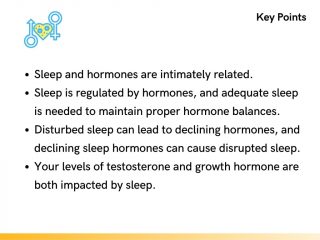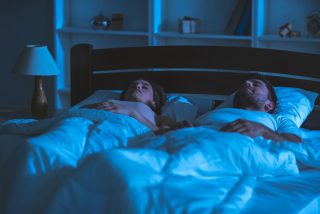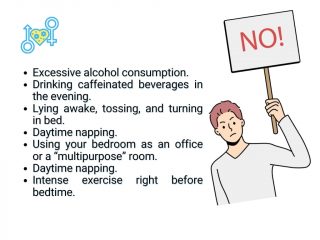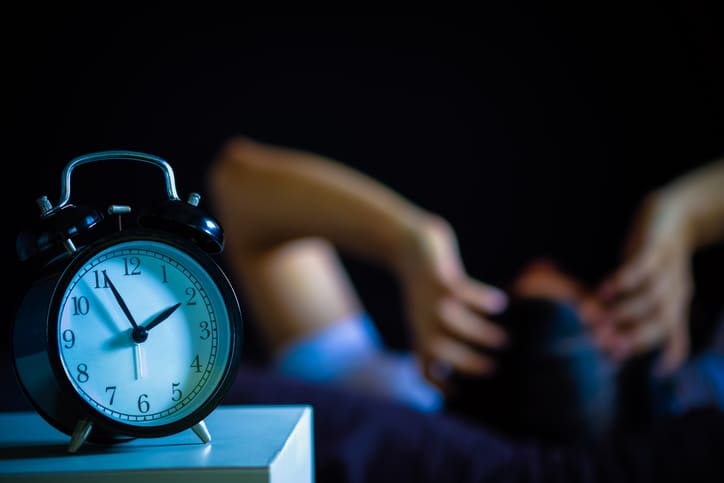Sleep and hormones are intimately related.

There are several hormones that regulate or influence sleep. Sleep and your sleeping hormones are kind of a two-way street, meaning that as your sleep hormones decline, it can lead to disturbed sleep, and not getting enough sleep can lead to the decline or imbalance of the hormones related to sleeping. This creates kind of a vicious cycle of poor or disturbed sleep.
Two of the most important hormones related to sleep are human growth hormone and testosterone. Unfortunately, both of these hormones decline with age, which is a good reason why older folks — particularly men over 40– suffer from insomnia and other sleep disorders.
Understanding Sleep Hormones
There are several hormones involved in regulating sleep. Having an imbalance in any one of them can lead to insomnia or disturbed sleep, and disturbed sleep can negatively impact the level of these hormones.
What Are Sleep Hormones?
The term “sleep hormones” applies to any hormone that plays a role in regulating or influencing sleep in some way. Some sleep hormones like human growth hormone (HGH) not only play a role in sleep, but also are produced during your periods of most restful sleep. Therefore, disturbed sleep can have quite a negative impact on sleep hormones like HGH that are produced when you are sleeping.
In addition to HGH, other sleeping hormones include:
- Testosterone
- Cortisol
- Estrogen and progesterone
- Melatonin
- Thyroid hormones
So, how are each of these related to sleep?
Melatonin controls sleep patterns and tells your body when to get to sleep. Thyroid hormones also help regulate your sleep-wakefulness cycle; cortisol is related to stress, and lack of sleep increases stress and visa-versa.
But one of the most impactful hormones related to sleep is human growth hormone.
Symptoms of Declined Sleep Hormones
The first sign that you may be suffering from declined sleep hormones is, of course, having trouble sleeping. But beyond that, particularly if we are talking about declining levels of HGH, you may also notice:
- Daytime sleepiness and chronic fatigue.
- Poor focus and concentration.
- Weight gain.
- Irritability and other mood swings.
- Lack of libido and other sexual health issues.
Sleep and Hormones: Understanding the Connection
Sleep affects many hormones in the body, including growth hormone. Not getting enough sleep can influence HGH and the levels of other “sleeping hormones.” That’s why a good night’s sleep is essential to keeping your hormones balanced.
Causes of Declined Sleep Hormones
There can be many reasons for declined sleep hormones, but the most common, particularly when we are talking about HGH and testosterone, is the normal decline in these hormones as you age. As we have already mentioned, not getting enough sleep itself can lead to a decline in sleep-related hormones. Other causes of declined sleeping hormones include:
- Poor diet.
- Obesity.
- Smoking.
- Excessive alcohol consumption.
- Not getting enough exercise.
A decline in sleeping hormones and chronic insomnia could, in some rare circumstances, be a sign of disease or some other underlying medical condition such as sleep apnea. Long-term disturbed sleep should not be ignored, and you should seek medical advice for poor sleep that lasts more than a few weeks.
Prevention and Natural Remedies
It is easier than you might think to prevent sleep disorders, naturally improve sleep, and raise the levels of your sleeping hormones.
Prevention of Sleep Disorders
You can use sleep aids for occasional bouts of poor sleep. However, long-term use, even of over-the-counter sleep medications, is never a good idea. If you are having trouble sleeping, it is always advisable to use healthier methods to prevent sleep disorders and improve sleep rather than taking sleep medications. You can get a more restful sleep by:

- Getting enough daily exercise.
- Avoiding smoking
- Minimize your consumption of alcohol, particularly right before bed.
- Minimize screen time before bed.
- Listen to relaxing music or “sleep sounds.”
- Do not eat a heavy meal before sleeping.
- Sleep in a very dark, cool room.
- Avoid caffeinated beverages, especially close to bedtime.
- Have a consistent time to go to bed and to wake up.
Natural Ways of Increasing Sleep Hormones
In addition to taking the actions mentioned above to help you sleep, now that you know the relationship between sleep and hormones, utilizing methods to increase your level of sleep-related hormones is a surefire way to minimize disturbed sleep. In fact, improved sleep is one of the many benefits of growth hormone therapy as well as testosterone replacement therapy.
Other Ways to Boost Sleeping Hormones
In addition to hormone replacement therapies, you can improve sleep and boost your sleeping hormones by making better choices and lifestyle changes.
Lifestyle Changes for Better Sleep
You may not be able to control your hormone levels 100%, but there are actions you can take to improve your ability to sleep overall that could also aid in increasing your level of critical sleeping hormones such as HGH.
How to Improve Lifestyle for Better Sleep
You can take charge of getting better sleep by doing your best to create a positive sleeping environment. You can do this by adopting “good” sleeping habits and avoiding “bad” sleeping habits.
Good Sleep Habits to Adopt
- Do not eat anything for at least an hour before sleeping.
- Sleep in a cool, dark room.
- Sleep in loose-fitting, comfortable pajamas, and use comfortable sheets and bedding.
- Be consistent with the time you go to bed and wake up.
- Reduce screen time (phones and computers) right before bed.
- Make an effort to reduce stress.
- Get enough exercise – but do not work out right before bed.
Bad Sleep Habits to Avoid

As you might imagine, many of the bad “sleep” habits are the direct opposites of the “good” ones mentioned above, for example, do not eat just before bed or spend a lot of time on your phone. Other bad sleeping habits to avoid include:
HGH and Sleep: Understanding the Relationship
HGH is one of the most important sleeping hormones for adults. Sleep is healing and rejuvenating; one of the main reasons for the regenerative power of sleep is that HGH is produced and released into your bloodstream during your periods of REM or deepest sleep.
As much as 75% of your HGH is released during sleep. This is just one of the many reasons why a good night’s sleep is essential to good health. People suffering from insomnia or other forms of disturbed sleep are unlikely to be producing enough human growth hormone and, therefore, could be suffering from a growth hormone deficiency.
When you are not getting enough sleep, you are not producing enough HGH. Medical science has learned that this can then become a kind of vicious cycle. Not only is most of your HGH produced while you sleep, but people with low HGH often have trouble sleeping. So, it becomes a kind of downward spiral. The less HGH you make, the less sleep you get, the less sleep you get, the less growth hormone you make, and so on, often leading to chronic insomnia.
Studies have found that HGH therapy, such as a prescription for genotropin injections, can improve disturbed sleep. In fact, one of the first positive results that our patients on growth hormone report in the first few weeks of therapy is getting a better night’s sleep.

